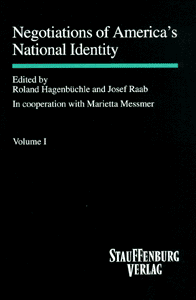
|
EUR 76,- ISBN 978-3-86057-339-6 Reihe: Transatlantic Perspectives |
|
 bestellen |
||
|
Wenn Sie Band 2 bestellen möchten, klicken Sie bitte hier! - If you would like to order volume 2 please click here! This collection of essays is the result of a three-day conference at the Catholic University of Eichstätt, Bavaria. Combining a historical with an interdisciplinary approach, the German and American contributors to this project explore the specificity as well as the problematics of America’s National Identity. After an introductory essay that addresses the question of myth, alterity and identity-construction, the articles assembled in the first section deal with the religious framework and its continuing importance for America’s self-awareness. Section two focuses on the political edifice and investigates the nation’s search for a New Political Philosophy. Section three deals with the interrelation between democracy, individualism and capitalism and probes the impact of modern technology. A forth section investigates the continuing tensions within the nation’s social fabric, analyzing the difficulties arising from a multicultural society. The articles gathered in section five tackle the conflicts between particularizing and universalizing tendencies and evaluate the ongoing effort at reconstructing an identity that is presently under severe strain. A concluding section explores the wider context of America’s National Identity: the United States and their self-understanding as celebrated, criticized and judged from abroad. Contents Roland Hagenbüchle and Josef Raab, Preface. Roland Hagenbüchle, Introduction: From Common Ground to Common Project. 1. The Religious Framework Emory Elliott and Winfried Herget, Introduction: From Providence to Capitalism. Winfried Herget, The Centrality of the Word. Olaf Hansen, Allegorical Interpretation and Providential Design. Ursula Brumm, Paradoxes and Puritan Selfhood: The Rungless Ladder of Salvation. Emory Elliott, "Saints" and "Strangers": America’s Chiliastic Dualism. Udo J. Hebel, The Negotiation of Puritan New England and Some Seventeenth-Century Origins of an American Rhetoric of Cultural Contradistinction. William R. Hutchison, Religion and Social Cohesion. Paul Boyer, Bible Prophecy Belief and the Shaping of America’s National Identity. Stephen Innes, From Calvinist Work Ethic to Capitalism. 2. The Political Edifice Jürgen Heideking, Introduction: From Temple to Skyscraper. Jürgen Heideking, The Constitution, Festive Culture, and America’s National Identity. Jürgen Gebhardt, Transformations of Classical and Religious Elements in the Creation of America’s National Identity. Kurt Mueller-Vollmer, The Discourse of a National Literature in the Early Republic, 1785–1846. James A. Henretta, The Birth of American Liberalism: New York, 1820–1860. Kurt L. Shell, Conflictual Politics: Parties and Interest Groups in the American Political System. Paul Goetsch, In the Bully Pulpit: Presidential Rhetoric Between Sermonizing and Agenda-Setting. Jane Sherron De Hart, Recreating Founding Paradigms: The Cold War and America’s National Identity. Gerd Hurm, Community, Commitment, and Criticism: The Rhetorical Embeddedness of Michael Walzer’s Communitarian Theory. 3. Individualism, Materialism, and the Luce of Technology Winfried Fluck and Leo Marx, Introduction: The Materialist Turn. Ludwig Deringer, "Unfinished Business": Cultural Identity and the American West. Mark Busby, Pushing the Frontier Beyond the Limit: From Providence to Progress. David M. Lubin, How the West Was Won and Lost at the National Museum of American Art. Dieter Meindl, The Cash-Woodward-Faulkner Nexus: Materialism and the New South. Dieter Schulz, Emerson’s Thrifty Soul and the Business of America. Winfried Fluck, "Money Is God": Materialism, Economic Individualism, and Expressive Individualism. Leo Marx, ‘Technology’: The Advent of a Hazardous Concept. Miles Orvell, Looking Backward to Disneyworld: Bellamy, Mumford, and the Fate of Paradise in America. 4. Expressions and Negotiations of America’s National Identity Heinz Ickstadt and Klaus Lubbers, Introduction. Klaus Lubbers, Constructing American National Identity: The Case of the Bald-Headed Eagle in Early Folk Art. Frank Kelleter, "Indians" as Metonymy, Metaphor, and Myth: National Self-Conceptualization and the Desire of Cultural Self-Transcendence in the Poetry of the Early Republic. Herwig Friedl, Thinking America: Emerson and Dewey. Christa Buschendorf, Turn-of-the-Century Self-Doubt: From Pessimism to the ‘Will to Believe’. Heinz Ickstadt, The (Re)Construction of an American Cultural Identity in Literary Modernism. Charles Altieri, Spectacular Anti-Spectacle: Ecstasy and Nationality in Whitman and His Heirs. Daniel Göske, Willmar, Nueva York, Buchenwald, Voronezh, Akron: (Trans)National Identities in Contemporary American Poetry. Peter Freese, Between Assimilation and Nativism: Popular Expressions of the Changing Concepts of National Identity. 5. Reinterpreting America: Universalism vs. Particularism Berndt Ostendorf, Introduction: A Nation’s Sense of Itself is Shaped by Wounds. Donald Pease, Americanisms after the Nation-State. Alan Trachtenberg, Imaginary Indians and American Identity: The Wanamaker Expeditions, 1908–1913. James Oliver Horton, Race in America’s National Identity: A Challenge for Public History. Lois E. Horton, A Complex Past: America’s African Heritage and the Evolution of African-American Identity. Amy Kaplan, Imperial Triangles: Mark Twain’s Foreign Affairs. Lothar Hönnighausen, Region, Nation and the Definition of American Identity in the Early Twentieth Century. Günther H. Lenz, Border Cultures, Creolization, and Diasporas: Negotiating Cultures of Difference in America. Paul Lauter, American Studies at the Borders: Identity and Discipline. Berndt Ostendorf, The Social Contract in Need of Revision? Some Notes on the Politics of Difference and Social Justice. Giles Gunn, Consensus and Dissent: Recreating a Common Democratic Purpose. 6. The Wider Context Helmbrecht Breinig and Arno Heller, Introduction: Everybody’s America. Arno Heller, "Everybody’s America" or How to Deal with Cross-Cultural Stereotypes of America’s National Identity. Waldemar Zacharasiewicz, Atlantic Double-Cross: Fictions and Frictions, 1830–1930. Rob Kroes, Travelling Theories, travelling Theorists: French Views of American Modernity. Hans-Joachim König, Inter-American Relations in Historical Perspective: Expressions of U.S.-American ‘Superiority’ and Latin American ‘Inferiority’. Josef Raab, Los Gringos: Latin American Literary Views of the U.S.A. Helmbrecht Breinig, America and the America: Self-Assertion and Self-Questioning in U.S.-American Writing on Latin America. Konrad Gross, America and Canada: Continentalist Approaches. Benjamin R. Barber, Epilogue: Multiculturalism as America’s Identity – Lessons for the World? Contributors Index |
| Zum Seitenanfang |
Bei Fragen oder Kommentaren zu diesen Seiten schicken Sie bitte eine E-Mail an: |